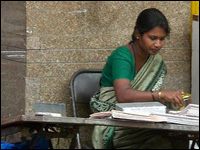Transcript
BOB GARFIELD:
In the central Indian city of Gwalior, women are taking control of the narrative. Housewives and low-paid workers, in most cases uneducated, are turning into investigative reporters, catching a rapist, exposing a sexual harasser, outing a fraudulent creditor.
Reporter Mridu Khullar wrote about these women and the paper they work for, Mahila Paksh, in this month's issue of East West Magazine. Khullar says the newspaper gives power to women in places where they have almost none.
MRIDU KHULLAR:
If, in rural India, parents have a daughter and a son and they have limited finances, those finances will be used for the son's education. In fact, we have a huge problem with girls being, once they're born, left at the railway station. Also there's a lot of people who have abortions when they find out that they're carrying a girl. So there's a lot of discrimination that happens here in India.
BOB GARFIELD:
You wrote about a small paper called Mahila Paksh¸ a provincial paper published in Hindi, written entirely by and for women. Can you give me a brief history?
MRIDU KHULLAR:
Mahila Paksh was started in 2003. It was started by a man named Rupesh Srivastava, who's 51 years old. And he had been working in politics and later in media for a long time, and he'd seen that women were always treated as second-class citizens.
So after he spent a long time and he was nearing his retirement, he thought he wanted to do something at the ground level. And he was living in Gwalior, and it was sort of a rural area where he was working, and he found that there the problems with women were even more than you'd find in cities.
So he decided to start a newspaper which would publish stories of these women who had nowhere else to go. And he, instead of hiring freelance reporters or full-time reporters, he thought why not give these women a platform in which they can talk, and talk to other women?
So he sat down with his wife and his daughter, who's 20 years old, and they started to publish Mahila Paksh, which is now sent all over India, and has around 60 reporters in Gwalior itself and 100 total around India.
BOB GARFIELD:
Now, these women are amateurs. They don't get paid for their writing, and some of them are not only new to journalism – are only just recently literate.
MRIDU KHULLAR:
Yes.
BOB GARFIELD:
What is the paper like to read?
MRIDU KHULLAR:
It's basically write like you talk. They get the facts and they put it all together, and then the publisher, his wife and his daughter, who are proper professionals, they look through it and they will edit it, and they go through rigorous procedures. And only then does it go into the paper. So while the people who are bringing the stories aren't professionals in the way we use the term "professional," they do bring the stories in, and then those are professionally edited and put into the papers.
Yes, these women – one, like you said, she was washing dishes for a living. And she came across this paper, and she said, well, I'd also like to do something. And Rupesh said, okay, well, why don't you learn to read and write and then bring me stories also?
So while she was bringing in stories, she was also learning how to read and write. And while she was doing that, she would get somebody who knew how to read and write and then dictate her story. And then it would come to Rupesh, who would then edit it and put it in the paper.
BOB GARFIELD:
So in that context, tell me about the impact of a paper like Mahila Paksh.
MRIDU KHULLAR:
It's a local paper. So, for instance, there was a woman who was working in a women's college, and she was teaching there, and she found that a lot of faculty members were being harassed by other male faculty members. And this had been going on for quite a while, but, you know, nobody was taking notice of it. They would complain about it but nobody did anything about it.
So when they had the opportunity, when Mahila Paksh started, Kalpana Saxena, who was the teacher there, she started writing about it, and eventually the dean had to do something about it. So the man who was harassing other female faculty members and students was transferred immediately, and it was ensured that he would never work in a women's college again.
Similarly on a local level, a woman was just walking around the field and she ran into parents who told her that their six-year-old daughter had been raped, and the rapist was still walking around. And she was horrified, and she wrote about it, and eventually used the clip in going to the police station. And getting all the details, they were actually able to get the rapist arrested.
So the paper has made tangible progress in how these people are living their lives, just the fact that these women are coming out of their homes and they have that power to make changes. And once they feel that they have that power, it just affects every little part of their life, not just in the profession itself but also at home, in their relationships. They begin to feel more confident.
And so it's like a whole community changing through that newspaper, which is really fascinating to watch.
BOB GARFIELD:
Well, Mridu, thank you so much.
MRIDU KHULLAR:
All right. Thank you so much, Bob.
BOB GARFIELD:
Mridu Khullar is a freelance journalist based in New Delhi. She's written for the Indian editions of Elle and Marie Claire magazines as well as East West Magazine, Women's eNews and The Times of India.


